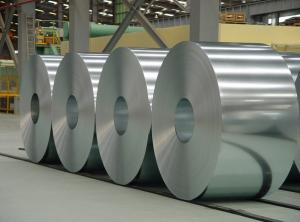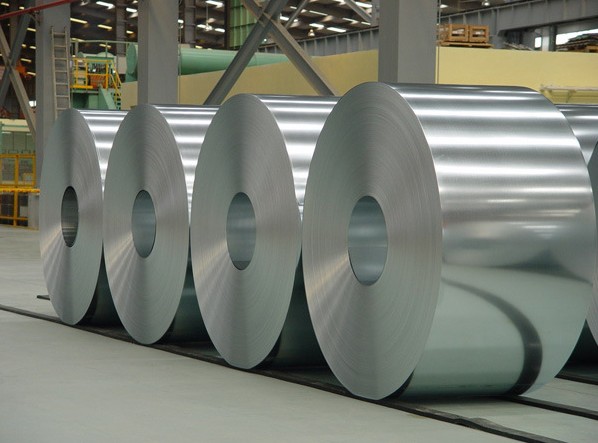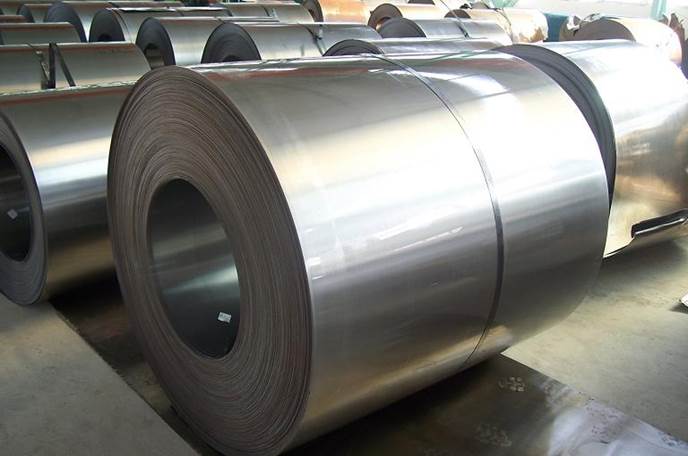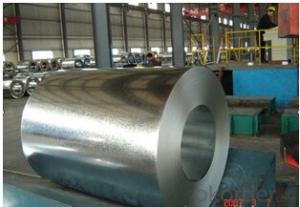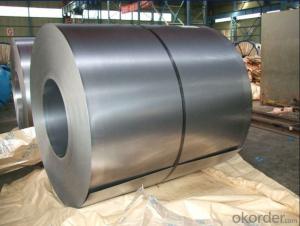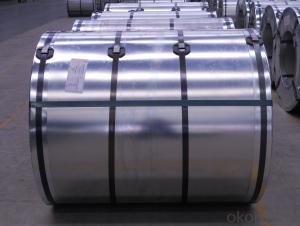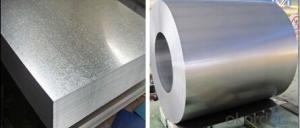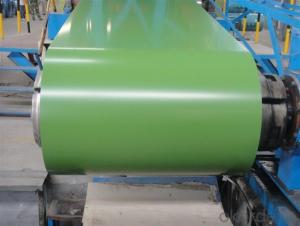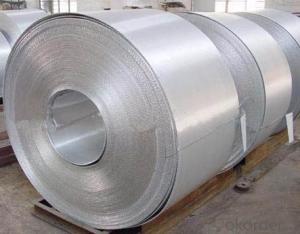High Quanlity Cold rolled steel coils
- Loading Port:
- China Main Port
- Payment Terms:
- TT OR LC
- Min Order Qty:
- -
- Supply Capability:
- -
OKorder Service Pledge
OKorder Financial Service
You Might Also Like
Specification
Product Name | Cold Rolled Sheet Coil |
Material | SPCC/SPCD/SPCE/DC01/ST12/ ST14/SPCD/DC03/DC04 ect. |
Grade Standard | JIS G3302, EN10142, ASTM653, ASTM95 |
Thickness | 0.15-3.5mm |
Width | 600mm-1500mm |
Coil ID | 508-610mm |
Coil OD | max 1500mm |
Weight | 3-10 Tons |
Tolerance | Thickness tolerance:+/-0.02mm; Width tolerance:+/-5mm |
Surface | No-skin passed or Skin passed, Tensile leveled |
Surface Treatment | Chromate/Unchromate passivation, fingerprint resistant treatment, oiled/unoiled |
Annual Output | 350,000MT |
Application | Construction, hardware, home applicances, interior decoration |
General Application of Cold Rolled Steel Coil:
Classification | Designation | Characteristics | Main applications |
Commercial quality | SPCC SPCCT | Commercial quality suitable for bending fabrication and simple forming; this is the type in greatest demand. | Refrigerators, cabinets, power distribution baords and drums. |
Drawing quality | SPCD | Drawing quality second only to that of SPCEN. Excellent uniformity. | Automobile floor and roof panels. |
Deep-drawing quality | SPCE SPCF | Deep-drawing quality.With metallurgically controlled grain size, it retains its beautiful finish even after being deep-drawn. | Automobile fenders and quarter panels |
Extra deep-drawing quality | SPCG | Extra-low-carbon steel sheets with highest workability | Automobile internal panels and deep-drawn parts |
- Q: I want to purchase steel for construction purpose, What aspects should I keep in mind while deciding that which company should I contact for this?
- I'd keep in mind whether your potential supplier is close enough to still give you good service, and provide delivery when you need it. I'd want to contact as many local companies as possible, in order to get competitive bids. Then, I'd pick the lowest cost bids that I felt would still provide the service I needed. Most decisions of this sort, in the end, are based on price.
- Q: How do steel coils contribute to the transportation industry?
- Steel coils play a significant role in the transportation industry due to their versatility and durability. These coiled steel sheets are used for various purposes, such as manufacturing automobiles, shipping containers, and railway cars. In the automotive industry, steel coils are used to produce various components, such as body panels, chassis, and engine parts. The strength and malleability of steel make it an ideal material for ensuring the safety and durability of vehicles. Additionally, steel coils are used in the manufacturing of shipping containers that are used to transport goods across the globe. The sturdiness and resistance to corrosion provided by steel coils ensure the protection of goods during transportation. Furthermore, steel coils are crucial in the railway industry. They are used to manufacture railway cars, including freight cars and passenger coaches. The strength and durability of steel make it ideal for withstanding the heavy loads and harsh operating conditions experienced by railway vehicles. Steel coils also contribute to the construction of railroad tracks and bridges, providing the necessary strength and stability for safe and efficient transportation. Overall, steel coils are essential in the transportation industry as they provide the necessary strength, durability, and versatility required for the manufacturing of various transportation vehicles and infrastructure. Their contribution ensures the safety, reliability, and efficiency of transportation systems, making them indispensable in the modern world.
- Q: How are steel coils inspected for bendability using bend testers?
- Steel coils are inspected for bendability using bend testers, which are specialized machines designed to measure the flexibility and bend resistance of the coils. The process involves several steps to ensure accurate and reliable results. Firstly, the steel coil is prepared by securing it firmly in place, usually using clamps or other mechanisms to prevent movement during testing. This ensures that the coil remains stable and allows for consistent and repeatable measurements. Next, the bend tester is set up according to the specified testing parameters. These parameters typically include the desired bend angle, the speed at which the bend is applied, and the number of cycles to be performed. The bend tester is equipped with a bending mechanism that exerts a controlled force on the coil, simulating the bending conditions it may undergo during its application or use. Once the bend tester is set up, the bending process begins. The machine applies a gradually increasing force to the steel coil until it reaches the desired bend angle. This force is carefully measured and monitored throughout the process to ensure accuracy. During the bending process, the machine records and displays important data, such as the applied force, the angle of bend, and any indications of cracking or other defects. This data is crucial for evaluating the bendability of the steel coil and determining whether it meets the required standards. After the desired bend angle is reached, the coil is released from the bending mechanism, and any residual stresses are allowed to relax. This relaxation period is important to observe any potential spring-back effect, where the coil partially returns to its original shape after bending. The amount of spring-back is also measured and recorded for further analysis. Finally, the inspection results are analyzed to determine the overall bendability of the steel coil. If the coil meets the specified bendability criteria, it can be considered acceptable for its intended application. However, if any cracks, fractures, or excessive spring-back are detected, further investigation and analysis may be required to identify the cause and determine appropriate corrective actions. In conclusion, bend testers play a vital role in inspecting steel coils for bendability. Through a controlled and systematic process, these machines accurately measure the flexibility and resistance to bending, helping to ensure the quality and reliability of steel coils used in various industries.
- Q: If you keep it dry and clean, what steel will last the longest over the years with continued use and sharpening?
- Hard okorder /: The nature, composition, and thickness of the protective surface oxides that form on titanium alloys depend on environmental conditions. In most aqueous environments, the oxide is typically TiO2, but may consist of mixtures of other titanium oxides, including TiO2, Ti2O3, and TiO. High-temperature oxidation tends to promote the formation of the chemically resistant, highly crystalline form of TiO, known as rutile, whereas lower temperatures often generate the more amorphous form of TiO, anatase, or a mixture of rutile and anatase. Although these naturally formed films are typically less than 10 nm thick and are invisible to the eye, the TiO; oxide is highly chemically resistant and is attacked by very few substances, including hot, concentrated HCl, H2SO4, NaOH, and (most notably) HF. This thin surface oxide is also a highly effective barrier to hydrogen.
- Q: Is there any other way of testing whether or not you have a 1944 Steel penny that won't damage the penny. The magnet test doesn't seem to work cause even when I try to get a 2007 penny to stick to the magnet...it won't. So is there some kind of magnet needed? Like power wise or anything like that, if not then I need to know what are other ways of testing the 1944 penny.
- 1944 Steel Penny
- Q: How are steel coils used in the manufacturing of fuel systems?
- Steel coils are commonly used in the manufacturing of fuel systems to create various components such as fuel tanks, pipes, and fittings. These coils are often shaped, cut, and welded to form the desired fuel system parts. The high strength and durability of steel make it an ideal material for fuel systems, ensuring the safe and efficient transportation of fuel.
- Q: How are steel coils used in the manufacturing of drivetrains?
- Steel coils are used in the manufacturing of drivetrains as they provide the necessary strength and durability required for various components such as gears, shafts, and bearings. These coils are often shaped and machined to create specific drivetrain parts that can withstand the high pressures and forces involved in transferring power from the engine to the wheels.
- Q: Are steel coils used in shipbuilding?
- Yes, steel coils are commonly used in shipbuilding. They are primarily used to manufacture various structural components and hull sections of ships due to their strength, durability, and resistance to corrosion.
- Q: How do steel coils contribute to strength and durability in manufacturing?
- Strength and durability in manufacturing are enhanced by steel coils in several ways. Firstly, steel possesses inherent strength due to its high tensile strength, enabling it to bear heavy loads and resist deformation. Coiling steel involves hot rolling or cold rolling, which further enhances its strength and durability. During hot rolling, steel is heated to high temperatures and passed through rollers to shape it into a coil. This process aligns the steel's grain structure, resulting in a more uniform material with reduced internal stresses. Consequently, it becomes stronger and more resilient, maintaining its structural integrity even during manufacturing processes like bending, stamping, and forming. In contrast, cold rolling involves passing steel through rollers at room temperature. This process not only increases strength and hardness but also improves the surface finish. Cold-rolled steel coils are known for their smooth and uniform appearance, making them ideal for applications where aesthetics are crucial. Moreover, steel coils can be coated with various protective layers to enhance durability. Coatings like zinc or polymer-based ones act as barriers against corrosion, moisture, and other environmental factors that can weaken the steel. By preventing rust and degradation, these coatings prolong the lifespan of steel coils and the products they are used in, making them more durable and cost-effective in the long term. In summary, steel coils contribute to strength and durability in manufacturing by providing a resilient material capable of withstanding heavy loads and resisting deformation. The hot rolling and cold rolling processes further enhance the steel's strength and uniformity, while protective coatings prevent corrosion and extend the coils' lifespan. Ultimately, steel coils are indispensable components in manufacturing, enhancing the strength and durability of a broad range of products.
- Q: How are steel coils used in the production of consumer goods?
- Steel coils are used in the production of consumer goods as they are processed and shaped into various components, such as sheets, tubes, and wires. These components are then utilized in manufacturing a wide range of products, including automobiles, appliances, furniture, and construction materials. The high strength and durability of steel make it an ideal material for consumer goods, ensuring their longevity and performance.
Send your message to us
High Quanlity Cold rolled steel coils
- Loading Port:
- China Main Port
- Payment Terms:
- TT OR LC
- Min Order Qty:
- -
- Supply Capability:
- -
OKorder Service Pledge
OKorder Financial Service
Similar products
Hot products
Hot Searches
Related keywords
